The creator of Veja sneakers: ‘Opacity is cheap. Being transparent is expensive’
We spoke with Sébastien Kopp, cofounder of the shoe brand, which just opened its sixth store. It celebrates 20 years going against the grain of the fashion industry
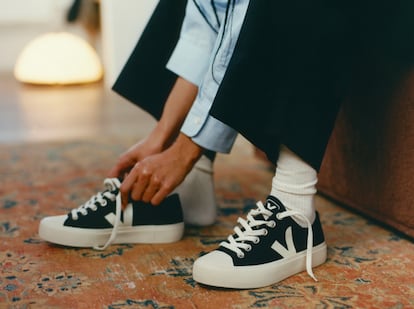
A few decades ago, Sébastian Kopp and François-Guislain Morillion were two twenty-something friends who had just finished their studies and worked in banking. “There was no meaning to it. Everybody has to earn a living, but the only objective was money,” Kopp says over the phone from Paris’s Veja offices. They wanted to make the world a better place. So instead of foregoing the utopian cliché, they raised €10,000 and in 2004 founded a sneaker brand, despite not being fashion people.
The brand, which is now globally renowned, puts people and the planet first. “We studied for six or seven years, we spoke many languages, we lived in central Paris, one of the capitals of the world, we had the backup of our parents. We didn’t have anything to lose. We asked the question, what if we try to prove that something else is possible?” They didn’t pay celebrities to wear them, but their sneakers became the favorites of names as varied as Reese Witherspoon, Katie Holmes, Emily Ratajkowski, Meghan Markle and Kate Middleton. Wearing them has become a way of standing up for more labor conditions and fashion with less environmental impact.
The company just inaugurated its sixth store in Madrid, after opening shops in Paris, New York, Bordeaux and Berlin.
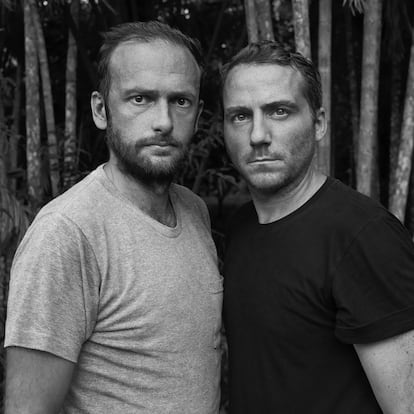
Question: At least until the post-pandemic period, it was said that physical commerce was in crisis. Why did you decide to open a new store?
Answer: Between a chain store and e-commerce, there isn’t much difference. But now people are realizing that at physical stores, you can do events. You can do a lot of things beyond selling. That’s always been our strategy in the stores. We open a place that we know, that is carefully chosen and then carefully taken care of, and we do a lot of collaborations and parties. We have two in Paris, one in New York, and now one in Madrid.
Q: Why did you choose Madrid?
A: Everybody told us to go to London or China. We go to the cities that we feel are related to us, and we stay for many reasons. We don’t have investors or shareholders, so we are very free to do what we want to do, and that’s also part of the range of the brand.
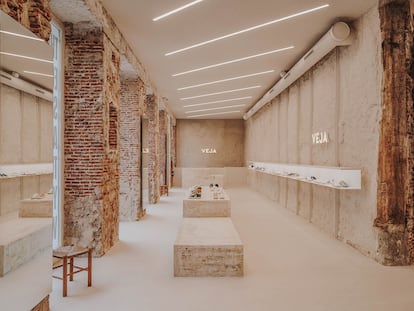
Q: In the last 20 years you have been present in many multi-brand stores around the world. How has their response to a sustainability-focused product changed?
A: At the beginning, we were very limited in terms of organic cotton shoes, because ours were made out of canvas with the ‘V’. The production was limited, and everybody wanted the shoes. At the beginning, we could choose, and we selected very carefully who would be the best ambassador of our vision in each country of vision. That’s why we chose Ekseption in Madrid, because they were very cool, very fashionable. There were just 10 of us, so it was crazy that they believed in us.
Q: And how many of you are there now?
A: We are 300 between Paris and Brazil. We also have a center in the Amazon dedicated to rubber and one for organic cotton.
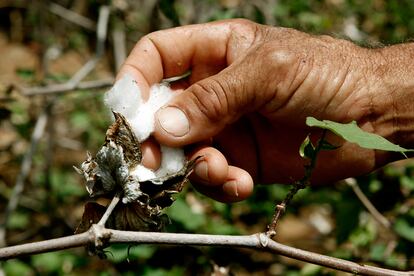
Q: How did you get started?
A: We didn’t know a lot. We read a lot about agriculture and became fascinated by working with the producers to calculate how much they should sell the cotton, because they were selling it really at a very bad price. We wanted to do a fair trade and organic cotton. Free trade means 40% paid in advance to the producers so they can live well. The first time, in 2000, we paid 55% more than the market price. The big difference in vision is that we are in the field. We go directly to the producers. We’ve been going to the fields for 20 years. That’s the big difference of vision that nobody understands. But we don’t care. We understand.
Q: Despite paying more to producers and workers, the price of your sneakers is aligned with the rest of the market. Is it an issue of margins?
A: It comes from an idea from 20 years ago, when we were 23 years old, and we said at the beginning, we don’t like advertising. Brands like Adidas take a big percentage of the cost of the shoe. The cost of producing a shoe in China is between 3 and 12 dollars, and communication is maybe 75% of the shoe costs because they spend billions on advertising. So we thought, if we take this money for communication and put it inside the supply chain, what others spend on television we can spend on organic goods. We have the same cost because our product is four, five times more expensive to make, but we don’t we don’t pay celebrities.
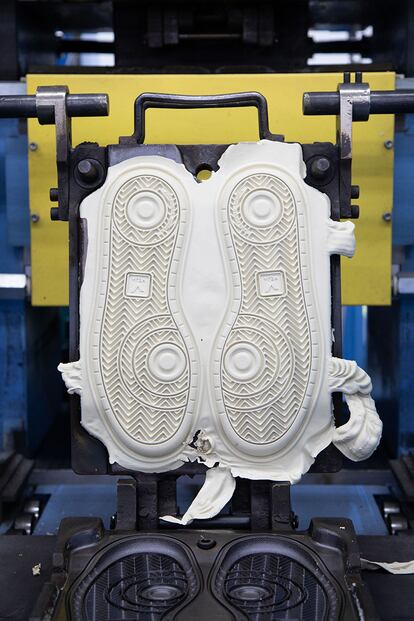
Q: How has the process changed to have less impact over the years?
A: With the knowledge that we have been acquiring. For example, in 2009 we started to introduce leather in some models. But taking the skin of the cow and transforming it into leather is a very polluting process in which heavy metals are used, so we said ‘we want to do it, but without using chrome in the tanning, but vegetables, with acacia.’ No one understood, but we didn’t care. Then we wanted to know where that skin came from, its traceability. If it came from cows from the field or cows from the cattle industry. Knowing what they ate, genetically modified or organic food. Veja’s twist is not just sustainability or fair trade, it’s traceability. Because when you know and when you have data you can change, you can improve. If you don’t know where things come from, how are you going to change them? All our innovation is based on traceability.
Q: And what is the most polluting process in the manufacture of one of your pairs of shoes today?
A: We did a big study of CO2 emissions in 2017 in which we analyzed how much it meant to move the rubber from the Amazon, the impact of its use by customers, absolutely everything. And the most polluting process is leather tanning. So we decided to reduce its use and try to vary the process to reduce the impact. Now we are having very good results thanks to the raw materials team, which is fantastic.
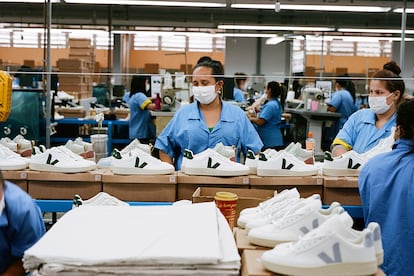
Q: Although there is high demand from consumers, even today there are very few companies that have this level of traceability. Why do you think there is still so little transparency?
A: Opacity is cheaper. Being transparent is very expensive. It is cheaper to close your eyes and not want to see things. When you don’t know where they come from, when you don’t look at the origin, everything is cheaper. On the other hand, when you travel to Brazil and see the people and their families in the cotton fields, you return and you want to fight for them, you want to fight with them.
Q: It is often forgotten that sustainability must also take people into account, not just the planet. It’s a buzzword, sustainability, but as such it risks going out of fashion. Is it possible for the industry to go backwards?
A: Yes, of course, it is always possible to take steps back. Democracies can go backwards, everything can go backwards. But preventing it is our job. We had this idea in 2004, we launched Veja in 2005 and everyone told us that people didn’t care about this: an initiative around organic cotton, around rubber, the social conditions of workers, factories, and look what Veja is today. I don’t know people’s minds, I don’t know if these are issues that concern them, but it is our job to put the spotlight on these issues.
Q: Last week the UN published a report in which it asked the fashion industry to stop promoting consumerism. How many pairs of shoes can you have?
A: We control this, we control the growth of Veja. We say no to many things. For every thing we accept we reject 100. We don’t want to grow too fast. We apply our values to Veja, so we don’t do many discounts, the designs hardly change from one season to the next, we believe that good design lasts 5 years, 10 years, 20 years. Good design is our mission, so we only create one or two new models every year, we go at a leisurely pace. Right now we could have opened 100 stores around the world, but we don’t want to, we’d rather have 10. And that’s great.
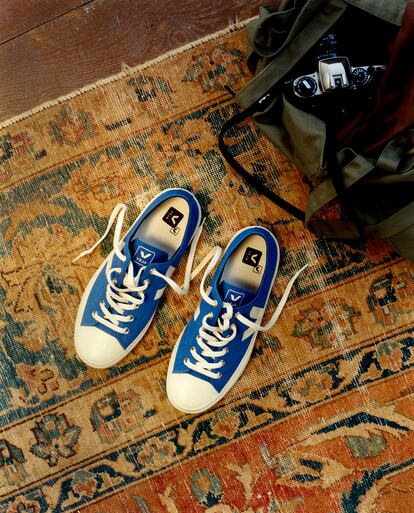
Sign up for our weekly newsletter to get more English-language news coverage from EL PAÍS USA Edition
Tu suscripción se está usando en otro dispositivo
¿Quieres añadir otro usuario a tu suscripción?
Si continúas leyendo en este dispositivo, no se podrá leer en el otro.
FlechaTu suscripción se está usando en otro dispositivo y solo puedes acceder a EL PAÍS desde un dispositivo a la vez.
Si quieres compartir tu cuenta, cambia tu suscripción a la modalidad Premium, así podrás añadir otro usuario. Cada uno accederá con su propia cuenta de email, lo que os permitirá personalizar vuestra experiencia en EL PAÍS.
¿Tienes una suscripción de empresa? Accede aquí para contratar más cuentas.
En el caso de no saber quién está usando tu cuenta, te recomendamos cambiar tu contraseña aquí.
Si decides continuar compartiendo tu cuenta, este mensaje se mostrará en tu dispositivo y en el de la otra persona que está usando tu cuenta de forma indefinida, afectando a tu experiencia de lectura. Puedes consultar aquí los términos y condiciones de la suscripción digital.









































